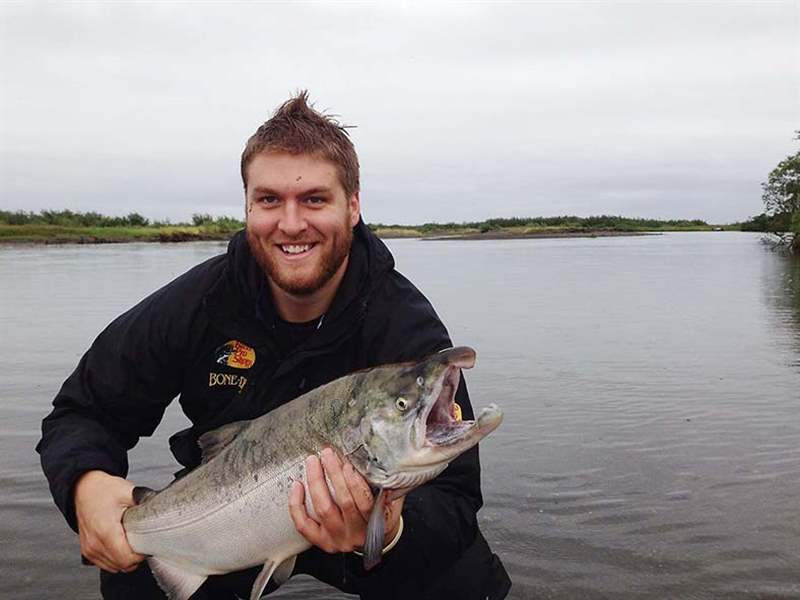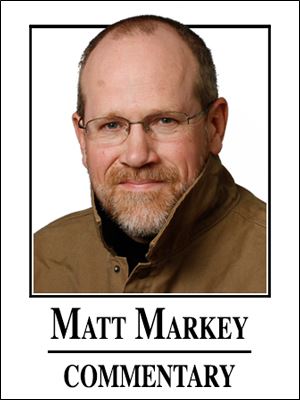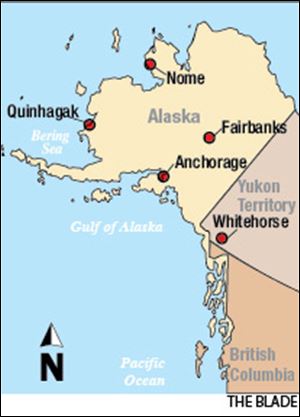
Alaska filled with many lessons for Northview graduate Hurst
4/6/2014
Tim Hurst, who graduated from Sylvania Northview and Kent State, is teaching in Quinhagak, Alaska, a remote village near the Bering Sea.

Tim Hurst is a lot closer to Russia than he is to Sylvania these days. In the tiny village of Quinhagak on the extremely remote west coast of Alaska, he has felt the brunt of 85-mile-per-hour winds off the nearby Bering Sea and dealt with the solitude and isolation that comes with being physically cut off from the rest of the world.
“There definitely was some culture shock coming up here, and after living in Sylvania, it kind of catches you off guard,” said Hurst, who took on a 10-month assignment in August to teach at the school in Quinhagak. “Outside of the Aleutian Islands, this is as far west as you can go and still be in America. It is the middle of nowhere. You look out the window, and there’s nothing.”
Hurst attended a job fair last spring while finishing up his undergraduate degree in integrated language arts at Kent State. A recruiter from an Alaska school system was there, and Hurst was curious enough to speak with them.
“I did the interview more for the experience, but then I got a call from the principal and things just kind of clicked,” he said.
The 26-year-old Hurst had lived a bit of the vagabond life while playing junior hockey, and he was familiar with Anchorage through the sport, plus his father Tom had been stationed in Fairbanks years ago while serving in the Air Force. Still, it seemed like an awfully long leap.
“When I first got the offer, I was hesitant just because of distance,” Tim said. “I didn’t know much about Alaska beyond hockey, but my parents had always encouraged me to do what I wanted to do, not what was expected. I thought it was worth a try.”

Tim Hurst, who graduated from Sylvania Northview and Kent State, is teaching in Quinhagak, Alaska, a remote village near the Bering Sea.
The village of Quinhagak sits on the Kanektok River, south of the Yukon Delta National Wildlife Refuge, in a region freckled with lakes. Barges bring supplies in the summer, but there are no roads to Quinhagak — it is accessible only by boat, airplane, or snow machine.
There is one store, but no restaurants and no bars — the village is dry so there are no alcohol sales allowed.
“You miss the conveniences because literally, there’s nothing like that here,” Hurst said. “You are on your own, and if you can’t figure it out, you won’t last long.”
The population in Quinhagak is Yup’ik, an indigenous Arctic people who have resided at this site along the river for more than a thousand years. They are primarily subsistence hunters who also utilize the rich fishery in the region.
When Hurst arrived last August, he wasn’t a hunter and he had only fished a little. That changed in a hurry. On Hurst’s first days in Quinhagak, he was catching silver salmon in the Kanektok River with a couple of other teachers from the school.
“I’ve since learned that it’s the second-best salmon river in Alaska. People pay thousands of dollars to have guides bring them here to fish, and this river is right in my backyard,” Hurst said.
He shared the catch with some of the Yup’ik in the village. “You look out for those who can’t look out for themselves,” he said.
In his time in Alaska, the Northview grad also has been trapping for wolverine and beaver, he’s accompanied others who have taken mink or lynx, and been on a successful caribou hunt with a friend. He hunts ptarmigan often, and a couple of weekends ago, Hurst went on a moose hunt in the Yukon River area that required more than 500 miles of travel by snow machine.
“That was my first trip on a snow machine, and it was one heck of an introduction,” Hurst said.
A caribou yields up to 300 pounds of meat, while a moose can provide 500 pounds.
“For the most part, that’s how they get their meat here, by hunting and fishing,” Hurst said. “There’s wildlife all around, so if you know what you are doing, you’re not going to go hungry.”

Hurst teaches language arts and world history at the high school, Kuinerrarmiut Elitnaurviat. All of the students are Yup’ik, but most of the teachers are not.
“The kids are really shy, but once they warm up to you they are awesome,” he said. “The classes are very small — not at all like I’m used to from Sylvania. I think they will graduate five or six kids this year.”
In February, the school administration asked Hurst to return for next school year, and he accepted. He will fly home to Ohio this summer, but plans to be back in Quinhagak in early August, when the salmon fishing is best.
“The solitude gets to you at times, but I can handle it. The best part of this has been me growing as a person, with all of the experiences and things I didn’t think I’d be able to do, and learning all about hunting,” he said. “At first I wasn’t sure I would fit in. I’m a Sylvania kid, and we don’t drive snow machines around town.”
The only significant regret Hurst has is that his grandfather is not alive to experience Alaska with him.
Donald Hurst was an avid hunter and angler, but he passed away when Tim was just 10.
“I thought about him as soon as I found out I was coming to Alaska. My grandfather would be up here moose hunting with me, fishing for salmon — this is something he really would have enjoyed. There’s no question about who would be the most excited about me being up here — it would be him.”
Contact Blade outdoors editor Matt Markey at: mmarkey@theblade.com or 419-724-6068.
.